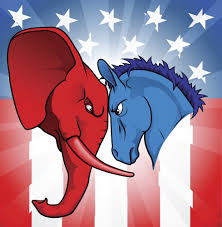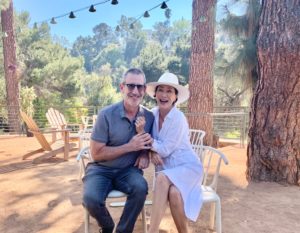
In marketing, our “enemies” are supposed to be our competitors. Territory gained and enemy casualties are measured in market share. Understanding that total domination is not possible (if we can’t wipe our adversaries from the face of the earth through business tactics – fair or unfair – our trust-busting government is there to make sure we don’t), we fight on.
But what happens when those who should be our “friends” are perceived to be enemies? As we all gathered last night to celebrate The Fourth of July with grand community-wide, public demonstrations of patriotism, it should have been abundantly clear that we are more divided than unified.
Many of our politicians serve party first and country second. “Blue States” and “Red States” seem to have few core values in common. Our president posts a video of himself “beating up the press” over “fake news.” (If he really thinks the news is fake, I wonder if he believes all his buddy Vince McMahon’s wrestling matches are real.)
Aren’t we all supposed to be on the same side here? Don’t we all, Republicans and Democrats cherish a free press? How did the Russians become more trusted than the Democrats in certain political circles?
I grapple with these issues in a different and very personal way when I conduct marketing research interviews and focus groups. I spent a good deal of last summer in the South working on several health care projects. The vitriol, the visceral hatred of Obama and everything he stood for was palatable. A few weeks ago I was in an agricultural area of Central California, a red dot in a big blue state, talking to donors and potential donors of a large non-profit group. One major donor, now retired, described how he gave to many causes, but was very active in only a few of them, the most important of which being dedicated to “correcting the liberal bias in American education.” Hmmm.
“I really don’t like these people,” is what first flashes through my mind. But my feelings are irrelevant and I must push them aside. I’m there to uncover insights and formulate strategies on behalf of my clients, not to judge their customers and prospects. As much as I’d like to engage in political discussions and “set them straight,” it would be highly inappropriate, it would not serve my clients well, and of course, it’s unlikely that any minds would be changed.
So, I let go of their political beliefs – so terribly wrongheaded and misguided to me – to drill down on the issues at hand. Then, a funny thing happens. After some conversation – sometimes just a few minutes’ worth – it dawns on me that I’m getting to like many of these respondents. When I listen without judgement, when I put myself into the required role of professional empathizer and keep my personal feelings out of the discussion, I start to see them in a very different light. This was particularly true in the context of discussions around charitable donation of time and money.
Some of my right-leaning respondents had knee-jerk reactions to anything that even hinted at liberalism. They recoiled at the mere mention of words like “sustainability” and “environment” before even trying to understand context and meaning. But these are people who clearly mean well. They care about community and they don’t just talk the talk – they walk the walk. They sacrifice their time and money for the less fortunate as well as causes they feel to be “bigger than themselves.” They aspire to make the world a better place.
I find myself wanting to get to know them better, wishing there was time to go out for coffee after the research session and continue our conversation on a more personal basis. These aren’t the two-dimensional “evil Republicans” or “ignorant Trump voters” that I think of every morning when I dig into the New York Times, listen to NPR and watch CNN, or those “terrible people” who agree with all I read when I venture out of the bubble to visit the Wall Street Journal, Drudge, Breitbart, Red State or Fox News.
Indeed, these are multi-dimensional, complex human beings. Something that so many of us have seem to forgotten in this age of rancor. I write this understanding how much of a cliché it is. But that doesn’t make it any less true, and we’d all be better off if we opened our minds to each other’s essential humanity.
While I’d like to go on here to preach how basic decency and understanding can heal the nation, I’ll resist the temptation to wade in over my head and stick to marketing issues.
Let’s start with another well-worn adage. We all need to communicate better. The type of communication where the only agenda is a free exchange of ideas with a priority on listening rather than proselytizing.
This is critical in marketing. It is often a good thing to bring working hypotheses into marketing research, but only to put stakes in the ground to frame a dialogue with consumers. It’s always a mistake to dictate an agenda or think we know everything beforehand – no matter how well we feel that we know our brand and our target.
Equally important is the type of research that best facilitates open communication. There is a lot to be learned from Big Data, but there is nothing like qualitative research for those big, emotional, personal deep-seated insights.
We often use data to put people in boxes. Upscale/downscale, red state/blue state, Democrat/Republican, redneck/snowflake, progressive/conservative. My experience in marketing makes clear that the essential way to move beyond labels into multi-dimensional insights is extended, face-to-face conversations with people.
This point was driven home to me by an interview with Alan Alda from a recent PBS News Hour. For those of you too young to remember, Alda was the star of M*A*S*H, the hugely successful TV series based on the Robert Altman film. Running from 1972 to 1983, the last show was the most viewed TV finale of all time, racking up over 105 million viewers, a 60.3 rating and a 77 share.
Alda’s bio on the PBS website tells us that “as an actor, educational TV host and founder of a scholarly center for communication science, Alan Alda has used his trademark humor and wit to help others express complicated ideas in accessible language. Now he’s written new book called, “If I Understood You, Would I Have this Look on My Face?”
While intended otherwise, I found the Alda interview to be a master lesson in marketing research.
It is almost always our task in marketing to explain “complicated ideas in accessible language to consumers.” If we are working in Silicon Valley, our focus might be on forging an easy to understand, emotional benefit from a labyrinth of highly technical features. Consumer-oriented communications, while dealing with simpler products and services, is no less complex. The goal of navigating through what can seem to be an infinite range of rational and emotional features and benefits to arrive at a simple, yet elegant and aspirational brand positioning is never easy.
Alda’s approach to communication, whether he is trying to explain science to non-scientists or working with actors to get them more in sync with each other, centers on curiosity and personal connection.
I was lucky enough to know Phil Donahue, the talk show personality whose format paved the way for Oprah, Ellen, and nearly every other contemporary daytime TV host. Much of my interviewing style is based on his approach. Donahue was a smart and confident man who humbled himself before his interview subjects. I wouldn’t quite describe it as “playing dumb” – he asked good questions – but he approached people and their expertise with a sense of childlike wonder. His questions always seemed sincere and innocent. Not only did this allow his studio and TV audiences to feel like he was one of them, but his demeanor encouraged his subjects to open up and tell him things that they might not otherwise say on television.
Alda, another very bright man, explains his success in interviewing scientists in the very same terms. “What I brought to it was curiosity and a huge fund of ignorance.”
This approach can serve marketers well. “I have no idea what it’s like to be a software engineer – or a mom with a job and three young kids running around – or someone who can’t afford health insurance – can you tell me about it?” If you’re truly curious, if you’re listening without judging, people will tell you nearly anything. Particularly if you can build on this humility to build personal connections. According to Alda:
“That process of connecting with them, getting them to be who they were, (is naturally enhanced) because (my interview subjects) were worried about getting me to understand (what they were talking about). So it was much more personal. And that’s when I realized that you could build on that. You could get people to do that all the time…It’s all based on a personal connection. That if I could sort of understand in some way, make some kind of approximation of what you are thinking and feeling, it’s easier for me to get inside your head with my message. If I don’t know how you’re receiving it. If I can’t see how it’s landing on you, then I’m just spraying it at you, I’m just trying to pour it into your head, but I’m not really connecting with you. Well that connection, and this is what I don’t understand, that connection with another person feels so good, why do we retreat from it? I don’t understand that.”
Big Data, brain scans, body scans and other advances in marketing research, executed well, will surely be accurate and even revelatory. But they can also be retreats, futile efforts in over-analysis and navel gazing, attempts to understand how the watch works without being able to tell time. Without the understanding gained by personal connection, none of it matters.




